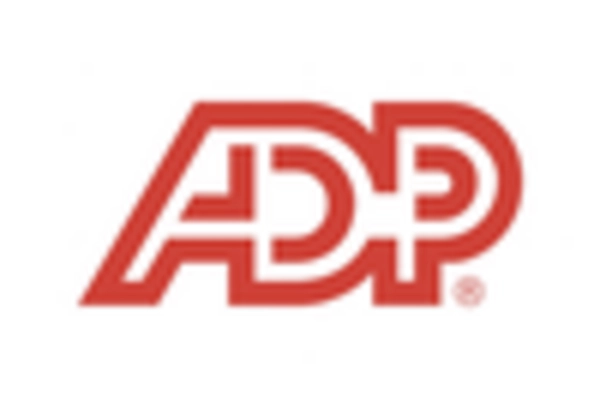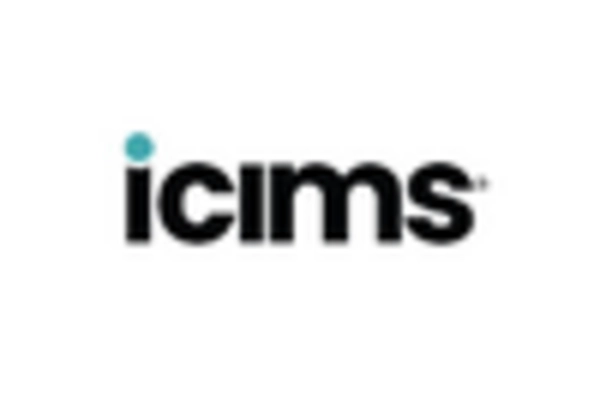Shift Towards Remote Work
The applicant tracking-systems market is adapting to the ongoing shift towards remote work. As organizations embrace flexible work arrangements, the demand for systems that facilitate remote recruitment processes is increasing. Companies are seeking solutions that allow for virtual interviews, online assessments, and collaborative hiring practices. This trend is likely to drive market growth, with estimates suggesting an increase of approximately 12% in the adoption of applicant tracking systems tailored for remote hiring. The ability to manage remote recruitment effectively is becoming a critical factor for organizations aiming to attract top talent in a competitive landscape. Thus, the applicant tracking-systems market is evolving to meet the needs of a changing workforce.
Focus on Candidate Experience
The applicant tracking-systems market is increasingly focusing on enhancing candidate experience. Organizations recognize that a positive recruitment experience can significantly impact their employer brand and attract high-quality candidates. As a result, there is a growing demand for applicant tracking systems that offer user-friendly interfaces, personalized communication, and timely feedback mechanisms. This shift is expected to contribute to a market growth rate of around 9% as companies strive to improve their hiring processes. By prioritizing candidate experience, organizations can differentiate themselves in a competitive job market, making it essential for applicant tracking systems to evolve accordingly. The emphasis on creating a seamless and engaging recruitment journey is reshaping the landscape of the applicant tracking-systems market.
Integration of Artificial Intelligence
The applicant tracking-systems market is witnessing a notable integration of artificial intelligence (AI) technologies. AI-driven features, such as resume parsing, predictive analytics, and automated candidate screening, are becoming increasingly prevalent. These advancements enable organizations to streamline their recruitment processes, reduce time-to-hire, and enhance the quality of candidate selection. The market is projected to grow by approximately 11% as companies leverage AI to improve efficiency and decision-making in hiring. The incorporation of AI not only optimizes recruitment workflows but also allows for more data-driven insights into candidate suitability. Consequently, the applicant tracking-systems market is evolving to incorporate these cutting-edge technologies, reflecting the changing dynamics of talent acquisition.
Regulatory Compliance and Data Security
The applicant tracking-systems market is significantly influenced by the increasing emphasis on regulatory compliance and data security. With the rise of data protection laws, such as the GDPR and CCPA, organizations are compelled to adopt systems that ensure compliance with these regulations. This has led to a heightened demand for applicant tracking systems that incorporate robust security features to protect sensitive candidate information. Companies are investing in solutions that not only streamline recruitment but also safeguard data integrity. The market is expected to see a growth rate of around 8% as businesses prioritize compliance and security in their hiring processes. Consequently, the focus on regulatory adherence is shaping the development of new features within applicant tracking systems.
Technological Advancements in Recruitment
The applicant tracking-systems market is experiencing a surge due to rapid technological advancements. Innovations in software development, particularly in cloud computing and mobile applications, are enhancing the functionality of these systems. As organizations increasingly adopt digital solutions, the market is projected to grow at a CAGR of approximately 10% over the next five years. This growth is driven by the need for efficient recruitment processes that can handle large volumes of applications. Furthermore, the integration of data analytics within applicant tracking systems allows companies to make informed hiring decisions, thereby improving overall recruitment efficiency. As a result, organizations are likely to invest more in advanced applicant tracking systems to streamline their hiring processes.















